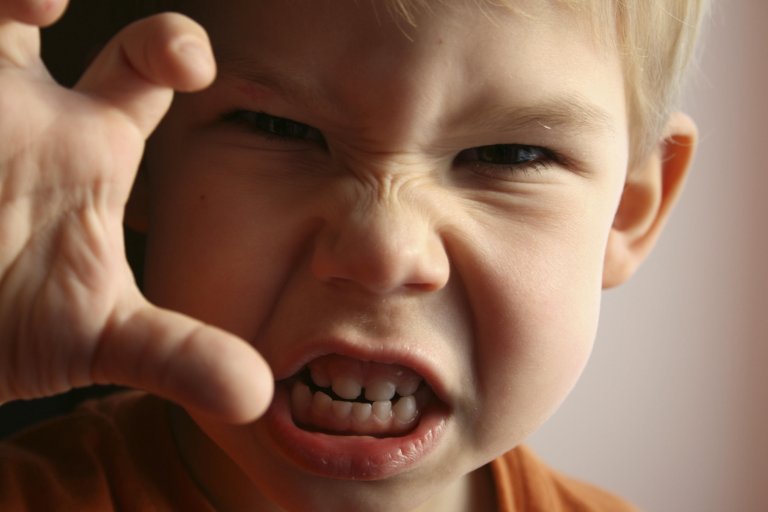Anger in Children: What Can Parents Do?

Anger in children is very common. It can be manifested through tantrums, kicks and even physical symptoms.
If it isn’t controlled, anger can become destructive. That’s why it’s important to teach your child how to handle this emotion in a healthy way.
Anger is an emotion that is frequently seen between the ages of 2 and 4.
Feelings of frustration appear whenever the child is faced with a situation they feel is unfair or unpleasant.
When dealing with this topic, many parents find themselves in no man’s land. How can adults take charge of this situation?
What is anger in children and how does it manifest itself?
Anger is a difficult emotion for children to handle. It consists of an unpleasant feeling or discomfort toward certain situations, which greatly disturbs them.
Children can express their anger through physical symptoms such as tensing up their muscles which increases their blood pressure.
There are other visible signs of anger such as sweating, reddening of the skin and headaches.
Their behavior is also affected: it can become difficult for them to move for no apparent reason.
Anger in children can also appear in the following ways: kicks, pushes, throwing toys, hair-pulling, screaming, biting and breaking things.
Causes of anger in children
A child’s anger is usually caused by internal or external issues such as:
- Stress.
- Physical or emotional problems that scare them.
- Frustration or impotence due to not being able to do something.
- Bipolar disorder.
- Depression.
- Looking for attention.
- Difficulty communicating.
- Hyper-sensibility to stimulation.
- Fatigue, insecurity and jealousy,
Showing their anger is a way that small children express themselves.
Although it isn’t the best way, they use their anger to show their parents that something is important to them.

The importance of showing children how to deal with anger
The feeling of anger can provoke undesirable behavior.
If a child always responds aggressively to frustration, this can make them turn into violent adults.
This can bring a lot of consequences in social, emotional and physical spheres.
“Anger is like a fire; it’s best to turn it off after the first spark. It’s too late after”
–Giovanni Papini–
12 techniques to control anger in children
Although a tantrum is normal every now and then, parents should strive to control this emotion in their children.
In order to achieve this, take the following strategies into account when it comes time to educate your child.
- Don’t lose control. If you respond to their anger by shouting, you’ll only make the situation worse. You’ll also be teaching your child that shouting is acceptable behavior.
- Help the child develop self-control capabilities. This way you’ll prepare them to deal with adverse situations.
- Give them time to calm down. Give them some space rather than arguing with them.
- Act firmly with patience and love. This will make the child accept their role within the family.
- Avoid correcting the child when you feel frustrated or upset. If you do, you run the risk of mistreating the child.
- Teach by example. The phrase “do what I say, not what I do” doesn’t work.
- Let the child know it’s okay to get angry, but that over-the-top reactions aren’t acceptable.
- Teach them to identify their emotions and how to use language to express them.
- State the reasons why you’re denying them from having something like eating too many treats or watching too much TV.
- Encourage entertaining activities that can help the child channel their emotions.
- Praise and congratulate your child when they do well.
- Teach the child to recognize their mistakes, to admit when they’re wrong and to ask for forgiveness.

Benefits of controlling childhood anger
It’s important for parents to teach their children how to express, channel and handle their emotions in the best way possible.
One of the advantages of this is that it promotes better communication between parents and their children.
The child will also learn there are other ways to express themselves instead of crying.
They’ll also learn about empathy as they learn how to control their emotions and interact with others.
Finally, it will help the child learn that both mom and dad are teachers.
If you believe your child is having a very difficult time calming down or if you notice they have frequent bouts of anger, it’s best to consult a specialist.
Experts have the capacity to evaluate and provide more techniques that can help control their anger.
Anger in children is very common. It can be manifested through tantrums, kicks and even physical symptoms.
If it isn’t controlled, anger can become destructive. That’s why it’s important to teach your child how to handle this emotion in a healthy way.
Anger is an emotion that is frequently seen between the ages of 2 and 4.
Feelings of frustration appear whenever the child is faced with a situation they feel is unfair or unpleasant.
When dealing with this topic, many parents find themselves in no man’s land. How can adults take charge of this situation?
What is anger in children and how does it manifest itself?
Anger is a difficult emotion for children to handle. It consists of an unpleasant feeling or discomfort toward certain situations, which greatly disturbs them.
Children can express their anger through physical symptoms such as tensing up their muscles which increases their blood pressure.
There are other visible signs of anger such as sweating, reddening of the skin and headaches.
Their behavior is also affected: it can become difficult for them to move for no apparent reason.
Anger in children can also appear in the following ways: kicks, pushes, throwing toys, hair-pulling, screaming, biting and breaking things.
Causes of anger in children
A child’s anger is usually caused by internal or external issues such as:
- Stress.
- Physical or emotional problems that scare them.
- Frustration or impotence due to not being able to do something.
- Bipolar disorder.
- Depression.
- Looking for attention.
- Difficulty communicating.
- Hyper-sensibility to stimulation.
- Fatigue, insecurity and jealousy,
Showing their anger is a way that small children express themselves.
Although it isn’t the best way, they use their anger to show their parents that something is important to them.

The importance of showing children how to deal with anger
The feeling of anger can provoke undesirable behavior.
If a child always responds aggressively to frustration, this can make them turn into violent adults.
This can bring a lot of consequences in social, emotional and physical spheres.
“Anger is like a fire; it’s best to turn it off after the first spark. It’s too late after”
–Giovanni Papini–
12 techniques to control anger in children
Although a tantrum is normal every now and then, parents should strive to control this emotion in their children.
In order to achieve this, take the following strategies into account when it comes time to educate your child.
- Don’t lose control. If you respond to their anger by shouting, you’ll only make the situation worse. You’ll also be teaching your child that shouting is acceptable behavior.
- Help the child develop self-control capabilities. This way you’ll prepare them to deal with adverse situations.
- Give them time to calm down. Give them some space rather than arguing with them.
- Act firmly with patience and love. This will make the child accept their role within the family.
- Avoid correcting the child when you feel frustrated or upset. If you do, you run the risk of mistreating the child.
- Teach by example. The phrase “do what I say, not what I do” doesn’t work.
- Let the child know it’s okay to get angry, but that over-the-top reactions aren’t acceptable.
- Teach them to identify their emotions and how to use language to express them.
- State the reasons why you’re denying them from having something like eating too many treats or watching too much TV.
- Encourage entertaining activities that can help the child channel their emotions.
- Praise and congratulate your child when they do well.
- Teach the child to recognize their mistakes, to admit when they’re wrong and to ask for forgiveness.

Benefits of controlling childhood anger
It’s important for parents to teach their children how to express, channel and handle their emotions in the best way possible.
One of the advantages of this is that it promotes better communication between parents and their children.
The child will also learn there are other ways to express themselves instead of crying.
They’ll also learn about empathy as they learn how to control their emotions and interact with others.
Finally, it will help the child learn that both mom and dad are teachers.
If you believe your child is having a very difficult time calming down or if you notice they have frequent bouts of anger, it’s best to consult a specialist.
Experts have the capacity to evaluate and provide more techniques that can help control their anger.
All cited sources were thoroughly reviewed by our team to ensure their quality, reliability, currency, and validity. The bibliography of this article was considered reliable and of academic or scientific accuracy.
- Alcázar Olán, R. J. (2012). Tipos de ira en niños. https://repositorio.iberopuebla.mx/bitstream/handle/20.500.11777/1987/Tipos+de+Ira+en+los+Niños.pdf?sequence=1
- Sukhodolsky, D. G., Kassinove, H., & Gorman, B. S. (2004). Cognitive-behavioral therapy for anger in children and adolescents: A meta-analysis. Aggression and violent behavior, 9(3), 247-269. https://www.sciencedirect.com/science/article/abs/pii/S1359178903000727
- Kerr, M. A., & Schneider, B. H. (2008). Anger expression in children and adolescents: A review of the empirical literature. Clinical psychology review, 28(4), 559-577. https://www.sciencedirect.com/science/article/abs/pii/S0272735807001365
- Garrison, S. R., & Stolberg, A. L. (1983). Modification of anger in children by affective imagery training. Journal of Abnormal Child Psychology, 11(1), 115-129. https://link.springer.com/article/10.1007/BF00912182
This text is provided for informational purposes only and does not replace consultation with a professional. If in doubt, consult your specialist.








